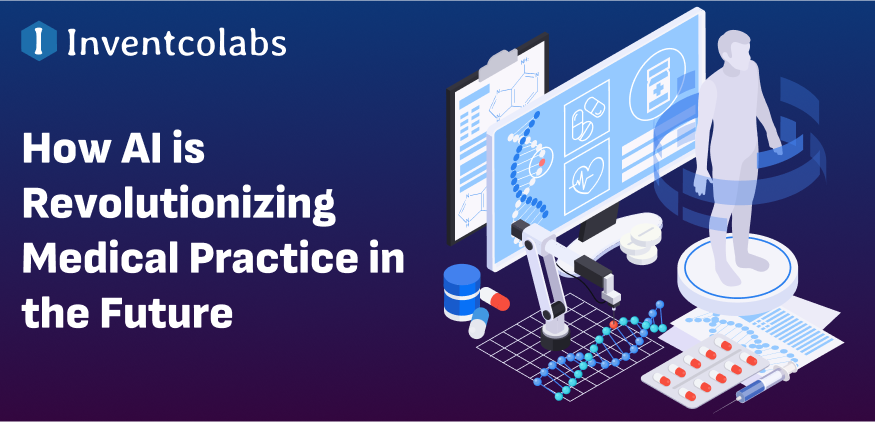In the intricate web of healthcare procedures, efficiency is desirable and an essential objective. In the healthcare industry, intelligent document processing is becoming increasingly important as a crucial element of change implementation as the sector struggles to handle massive volumes of data. The variety and complexity of the papers stored in the healthcare industry make manual processing tedious and error-prone. This issue is resolved by intelligent document processing in healthcare, which completely changes how records are kept and managed.
It surpasses the traditional approach to document capture by utilizing state-of-the-art technologies like optical character recognition, natural language processing, and machine learning to understand and intelligently analyze the data contained in a range of document types. This results in a more efficient document workflow, which is necessary in the quick-paced healthcare field. It also significantly increases the accuracy and reliability of the papers, cutting down on processing time.
What is intelligent document processing in Healthcare?
Improving the overall efficiency of healthcare delivery is the ultimate goal, rather than only using new technology to facilitate the shift toward document automation in the healthcare sector. IDP enables automating tasks like data entry, document sorting, and information retrieval that would otherwise take much time and human effort. There is a noticeable time savings as a result. For instance, automating the process of obtaining data from patient intake forms ensures that the information is collected correctly and readily available to medical professionals while expediting the registration process.
Information delivery platforms (IDPs) are crucial when optimizing healthcare workflow in facilitating seamless information transfer across various departments. IDP integrates with pre-existing Electronic Health Record (EHR) systems to update patient records automatically. By doing this, it is made sure that medical staff members have access to the most recent data. This connection is crucial, especially regarding instances like updating patient prescription lists—where accuracy is vital. To have the best document healthcare app for your organization, you need to hire a professional Document processing software developer with extensive experience working in the industry.
Reasons to Choose Intelligent Document Processing in Healthcare
Here is the list of reasons you should choose a Document processing software development company for your healthcare organization:

An Effective Technique for Extracting Data
The healthcare sector stores significant data in unstructured papers. These documents include bills, lab results, and medical records, to name a few. Intelligent document processing uses cutting-edge technology like Optical Character Recognition (OCR) and Natural Language Processing (NLP) to extract relevant data from these papers quickly and accurately. By using this intelligent data extraction, manual data entry is no longer necessary, saving time, and decreasing the possibility of errors.
Enhanced Precision of the Information
An intelligent document processing system lowers the risk of human error associated with manual data entry by automating data extraction. It ensures that the data gathered is trustworthy and consistent because of its capacity to precisely capture and analyze information from a wide range of document formats. The healthcare industry’s operations, including billing and coding accuracy, might be significantly impacted by this greater precision, ultimately leading to improved financial management and compliance.
Cost savings
Implementing intelligent document processing (IDP) in the healthcare industry has the potential to save a substantial amount of money. Businesses can use healthcare document processing automation to lower labor costs for data entry, sorting, and filing. Intelligent document processing also reduces the possibility of mistakes that could have costly consequences, including incorrect invoicing or delayed claims.
Enhanced Efficiency in Workflow and Productivity
Intelligent document processing in medical document automation helps optimize workflows for medical document processing by automating repetitive tasks. It can sort, categorize automatically, and route papers to the appropriate departments or systems. The application of automation in the healthcare sector not only boosts productivity but also frees medical staff to focus on more critical tasks requiring their expertise. Artificial intelligence-based document processing speeds up turnaround times, reduces processing times, and increases overall productivity. This is achieved by doing away with the necessity for manual document management
Safety and Adherence to Regulations
Because they handle sensitive patient data, healthcare organizations must always comply with laws like the Health Insurance Portability and Accountability Act (HIPAA). Medical document processing automation can help ensure compliance by processing and securely storing patient information. It provides audit trails, access controls, and encryption approaches to protect patient confidentiality and preserve data integrity. Enhanced tracking and monitoring of document processing processes is an additional advantage of automated workflows, simplifying compliance management.
Scalability and Integration
Because automated document processing technologies are so scalable, healthcare organizations can handle growing volumes of documents without significant infrastructure changes. They can be integrated with existing healthcare systems, including practice management software or electronic health records (EHR), to create a smoother data transfer process and significantly improve interoperability. This connectivity facilitates the unified picture of patient data and making fact-based judgments.
Benefits of Intelligent Document Processing in Healthcare
Here is the list of benefits that you explore with intelligent document processing in healthcare
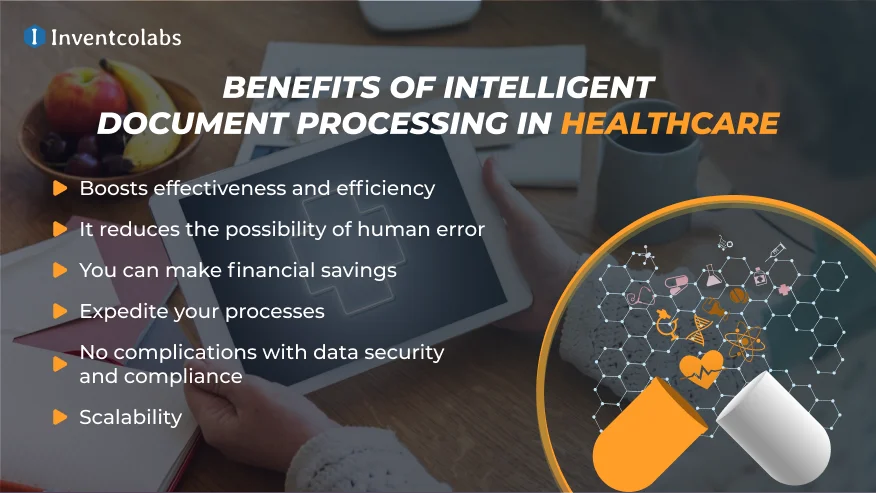
Boosts effectiveness and efficiency
One of the main benefits of Intelligent Document Processing (IDP) is that it reduces the need for labor-intensive tasks and human intervention in many document-centric workflows. There is only one situation where a human would be needed, and that is when there is a data issue that IDP technologies are unable to fix. Extracting, converting, sorting, and indexing data is completed in seconds using these IDP solutions. Yes, this includes unstructured documents as well. This is achievable by making these crucial business processes run much more smoothly. Additionally, many businesses find that the automation that Intelligent Document Processing systems can provide improves the general efficiency of their daily operation.
It reduces the possibility of human error
Unfortunately, mistakes are made by people. This is especially true when someone is trying to quickly enter a large volume of data. This can have many detrimental effects on a business in the modern era of the General Data Protection Regulation (GDPR). Even the absence of manual labor and data entry required by Intelligent Document Processing systems can significantly reduce the possibility of human error. Furthermore, these systems can manage any anomalies or issues that can emerge. This produces information that is more accurate and of higher quality while also streamlining the process of extracting and arranging data.
You can make financial savings
Securing the capacity to curtail costs and stay within a constrained budget is among the most crucial goals for every business. Intelligent Document Processing can also help you save money in a very short period. This is because they can reduce the number of staff needed to be hired. After all, these Intelligent Document Processing solutions increase processing speeds. Using these technologies can also aid in lowering the price of other running expenditures. Hiring healthcare app developers can help your organization handle their technical platforms effectively.
Expedite your processes
Any individual can find that managing massive volumes of data can be a very time-consuming. Nevertheless, the good news is that bots can easily handle processing large volumes of data like this one. One of the most significant benefits of intelligent document processing is the ability to expedite your processes. This is an additional benefit. After all, manually entering data takes a lot of time because it is labor-intensive, time-consuming and involves a lot of physical labor.
If your healthcare organization has some specialized requirements, you can opt for custom health app development services from reputed companies. While individuals need several minutes to do the same activity, IDP solutions can finish tasks in a matter of microseconds. Although a few minutes might not seem like much, they can add up to considerable time. Because of this, intelligent document processing software is great for cutting down on the time needed for these processes and significantly increasing their effectiveness.
No complications with data security and compliance
Intelligent document processing systems may help businesses become more compliant because of their ability to automate processes and reduce the possibility of human error. This and the preceding point are comparable. This is extremely important in today’s digital age, as people are growing increasingly worried about the security of their data and how it is being used.
Another benefit of IDP solutions is that they simplify compliance because they always leave a digital trail. After that, auditing can be done using this trail to verify that data protection laws are being followed. It’s also critical to remember that secure technology provides enhanced cybersecurity, ensuring that the data it holds is shielded from unwanted access and incapable of exploitation because only authorized users can access it.
Scalability
Another essential benefit of having best intelligent document processing software Systems is that these solutions may be applied to various situations. As a result, IDP is readily scalable and may help automate several key processes throughout your company. Furthermore, this eliminates the need to install any software; instead, it acts as a platform that can comprehend a broad range of documents, differing in size and place of origin, without requiring the establishment of guidelines or the installation of extra software.
Challenges of Document Processing in Healthcare
Though it faces several challenges, intelligent document processing can speed up and automate business processes primarily relying on paper.
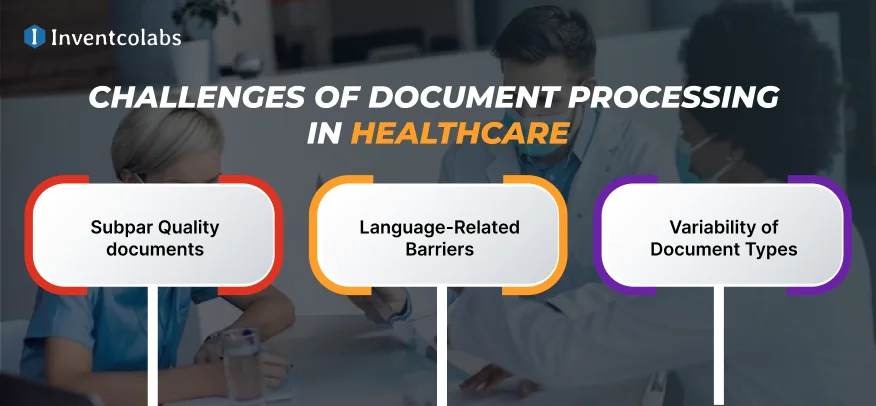
Subpar Quality documents:
Businesses that require a large volume of documentation work won’t entirely focus on the quality of the available documents. Many papers may be handwritten or scanned, leading to low image quality and complicating information extraction.
Language-Related Barriers:
Information and communication technology (IDP) systems may face language-related challenges from businesses catering to international clients. Due to the intricacy of natural language processing, intelligent document processing systems may find it challenging to handle multilingual papers. These systems must, however, be able to manage multilingual content.
Variability of Document Types:
An additional challenge for intelligent document processing systems is the multitude of papers that must be handled. Businesses may need to process multiple documents, each with its format, structure, and presentation. These papers could be passports, identity documents, application forms, and other paperwork. Creating an intelligent document-processing solution that works in every circumstance makes it challenging. Hiring dedicated developers to help healthcare companies overcome the challenges is recommended. Always look for a renowned mobile app development company to help yourself in the industry.
Intelligent Document Processing Use Cases for Healthcare
Intelligent document processing (IDP) has several applications in the healthcare sector that can improve patient care quality and ease the workloads of healthcare administrators. Here are a few instances of healthcare use cases:
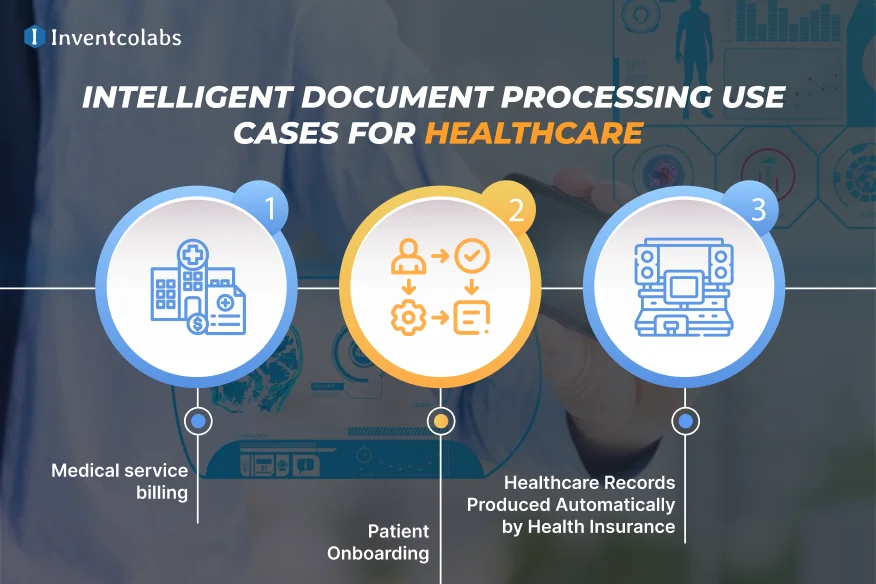
Medical service billing
One of the difficulties healthcare service desk employees face is managing an excessive volume of medical records. Completing this task becomes more challenging when bills are offered in many formats and originate from different sources. Intelligent Document Processing (IDP) in the medical billing process can capture a range of unstructured documents, such as medical claims and invoices, and convert them into text that computers can read through optical character recognition (OCR).
The retrieved data can be verified by testing it against the pre-created databases and rules to ensure accuracy and compliance. IDP streamlines data entry into billing software and electronic health record systems, reduces errors arising from human work and expedites filing claims to insurance carriers
Patient Onboarding
Intelligent Document Processing (IDP) has the potential to be a significant player in the healthcare sector by streamlining and streamlining the patient onboarding process. Enrolling new patients is essential to collecting and verifying their information. Ultimately, this leads to increased speed and accuracy in the patient onboarding process. IDP can automate document handling, data extraction, and insurance eligibility registration.
Healthcare Records Produced Automatically by Health Insurance
By using technology to extract, validate, generate, and process documents, intelligent document processing for healthcare insurance document automation helps to reduce the amount of paperwork related to insurance. In the operations of the healthcare insurance firm, it increases efficiency, lowers error rates, and ensures compliance.
Read more: AI-based Homecare Management App Development
Future Trends and Innovations of IDP(Intelligent Document Processing) in Healthcare
Here is the list of future trends and innovations for IDP:
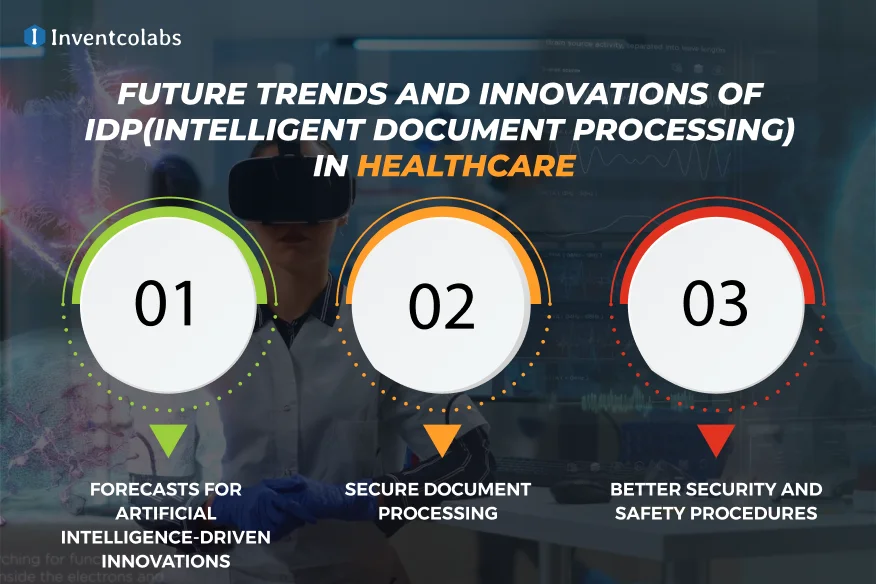
Forecasts for Artificial Intelligence-Driven Innovations
There will be more chances to find novel and intriguing ways to advance document processing with AI in the future. Predictive analytics, for instance, can enable intelligent document processing systems to anticipate user needs and streamline workflows. Machine learning models may learn to understand context, which would help them handle unstructured data more effectively and offer essential insights for decision-making.
Furthermore, integrating artificial intelligence with other cutting-edge technologies like blockchain could enhance the security and transparency of document processing. As artificial intelligence develops, intelligent document processing has countless opportunities for improvement. These developments should boost accuracy and efficiency.
Secure Document Processing
Increasingly, businesses are shifting their document processing functions to digital platforms, making implementing thorough security measures crucial. Future intelligent document processing systems will include multi-factor authentication, secure access controls, and advanced encryption techniques to safeguard sensitive data. Machine learning algorithms can help spot anomalies in document access patterns, which can lead to the sending of alerts about potential security lapses.
Additionally, integrating blockchain technology into intelligent document processing systems could produce secure and unchangeable ledgers of document exchanges. This ensures that the integrity of the documents is appropriately maintained and provides a transparent and auditable trail of document interactions.
Better Security and Safety Procedures
Given the increasing frequency of data breaches and cyber threats in the modern era, safeguarding sensitive information is crucial. Future trends in information and data protection (IDP) will mostly center on improving security measures to protect sensitive data from unauthorized access and hostile attacks.
Conclusion
Intelligent Document Processing, or IDP, is more than just a technological advancement in the healthcare sector—it is a driver of process development, holistic efficiency and process improvement. By automating document processing tasks, healthcare organizations may ensure they are prepared to meet the needs of the contemporary healthcare environment. They will be able to promote operational excellence and superior patient care. Healthcare app development companies are taking care of the situation and handling software development in the industry.
FAQs
Q. What is Intelligent Document Processing (IDP) in healthcare?
ANS. Intelligent Document Processing (IDP) in healthcare involves using advanced technologies, such as AI and machine learning, to automate the extraction and processing of information from documents. This streamlines administrative tasks and enhances data accuracy within the healthcare sector.
Q. How does IDP contribute to efficiency in healthcare operations?
ANS. IDP improves efficiency by automating data extraction, form processing, and document classification tasks. This reduces manual efforts, minimizes errors, and accelerates administrative processes in the healthcare industry, leading to enhanced overall operational efficiency.
Q. How does IDP impact data accuracy and compliance in healthcare?
ANS. IDP significantly improves data accuracy by automating the extraction and verification of information from various documents. This reduces the risk of errors and ensures compliance with healthcare regulations and standards, contributing to a more secure and reliable data environment.
Q. How can healthcare organizations implement IDP effectively?
ANS. To implement IDP effectively, healthcare organizations should assess their specific document processing needs, choose a suitable IDP solution, and integrate it seamlessly into their existing systems. Training staff on the new technology and continuously optimizing the IDP system are essential for maximizing its impact on healthcare operations.




